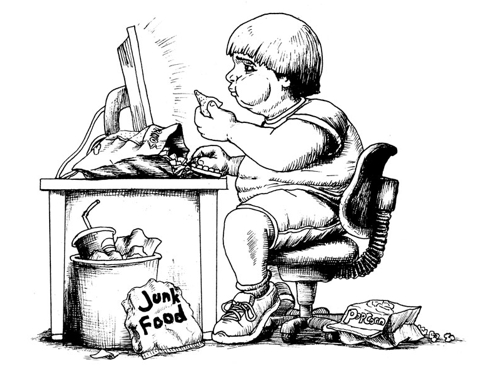The good Dr. Is back with another compendium of learned studies guaranteed to amaze and amuse you with their rationales and results. If Mondays make you miserable, read on and get in a little giggle before the weekly lock down drudgery commences. And try not to nod your head in agreement too strongly. You’ll hurt yourself…
 Kids will naturally gravitate toward sources of
Kids will naturally gravitate toward sources of
the stuff they covet; i.e.- junk food. Duh.
Dr. Obvious surprised me over the weekend with a new collection of articles from the world’s learned journals, all of which share one defining characteristic: they probably didn’t need to be done, because their outcomes were already obvious to anybody with a brain as soon as their stated objectives were… well… stated. Read on and marvel at the spectacle of The Scientific Method gone nuts.
Kids gain weight when new convenience stores open nearby
Summary:
A new study found that changes in the food environment around low-income and high-ethnic/racial minority populations over time impact childhood obesity. Increased availability of small grocery stores selling a selection of healthy items in close proximity to children’s homes improves their weight status over time, whereas increased availability of convenience stores selling predominantly unhealthy foods is likely to be detrimental.
Dr. Obvious:
Duh. If the stuff kids crave isn’t available, they’ll default to whatever is available.
Maggie J.:
Forty years ago, as a reporter for a local radio station, I was attending neighbourhood development planning committee meetings where gangs of local parents regularly sought to block the opening new new convenience stores because they didn’t want their kids to have easy access to junk food.
More years of obesity means higher risk of disease
Summary:
People with obesity do not all share the same risk for the development of cardiometabolic disease risk factors. The duration a person has spent with obesity over their lifetime has been hypothesized to affect this variation. […] More years of obesity was associated with worse values for all measured cardiometabolic risk factors.
Dr. Obvious:
Duh. All you have to do to reach the same conclusion is watch to see how much younger fat people are dying than fitter people.
Maggie J.:
We’ve all just intuitively known this amazing ‘study-demonstrated new scientific fact’ for years.
Older adults in wealthier countries drink more alcohol
Summary:
Alcohol consumption among older adults is trending higher across numerous countries, and alcohol use disorders among adults 65 and older have more than doubled in the last ten years. Moreover, there are signs that alcohol consumption is further increasing during the pandemic. Alcohol use is higher in countries with higher incomes and standards of living.
Dr. Obvious:
Duh. Older folks drinking more? Look what they’ve had to put up with, dealing with the generations that have followed them. And keep in mind that alcohol is an addictive substance that older folks will have been ‘enjoying’ all their lives. What better way, they postulate, to escape (even for an afternoon or however long) from the realities of the COVID-19 ‘lifestyle’? If you want to drink, the cost (no matter how much tax is piled on top) is of no consequence.
Maggie J.:
What better way, older folks postulate, to escape (even for an afternoon or however long) from the realities of the COVID-19 ‘lifestyle’? If you want to drink, the cost (no matter how much tax is piled on top) is of no consequence. In fact, even those among the oldest of us oldsters have been dealing with heavily-taxed booze all our lives. The cost factor is transparent. Greater prosperity means easier access. And most oldsters will choose booze over drugs to dull their sorrows. It’s simply life experience and force of habit.
New study shows every week of lockdown increases binge drinking
Summary:
Harmful drinking among adults increases the longer they spend at home in lockdown. The findings show the odds of heavy alcohol consumption among binge drinkers – those who, within two hours, consumed five or more drinks for men and four and above for women – rose an extra 19 percent for every week of lockdown. The odds of increased alcohol intake overall for binge drinkers was more than double that of people who did not drink excessively (60 percent vs 28 percent), especially those with depression or a history of the disease.
Dr. Obvious:
Duh. The lockdown just increases the intensity of stress factors that lead to binge drinking (or eating, or any other activity that gives a person comfort, such as video-gaming, for instance).
Maggie J.:
Binge drinking is commonly associated with the young who experience fewer and less severe consequences from the activity, and some of whom wear their hangovers like badges of honour. Older binge drinkers tend to be heavily addicted drinkers who use alcohol as a means of escape from their other issues, including depression and fear and frustration.
My take
What a bunch of pap. There’s nothing in the studies encapsulated above that most of us didn’t already know or suspect from out own observation and experience. We may now have percentages and ratios and so on attached to the ‘facts’, but that’s secondary to the main points.
There’s an old maxim in learned circles that, as a funded researcher at a respected university or other institution, one must either ‘Publish or Perish’. It’s about the reputation of the institution and your tenure. Dr. Obvious says there’s always a rush to publish softball studies like these toward the end of the year, when tenure, funding and promotion decisions for the coming year are being discussed at the highest levels of the Ivory Towers. It must seem silly to the average person, who holds the most-respected researchers at the most-respected institutions in high esteem. But they can, as the good Dr. so blithely puts it, be just as venal and petty as the rest of us when their personal interests are involved.
~ Maggie J.

